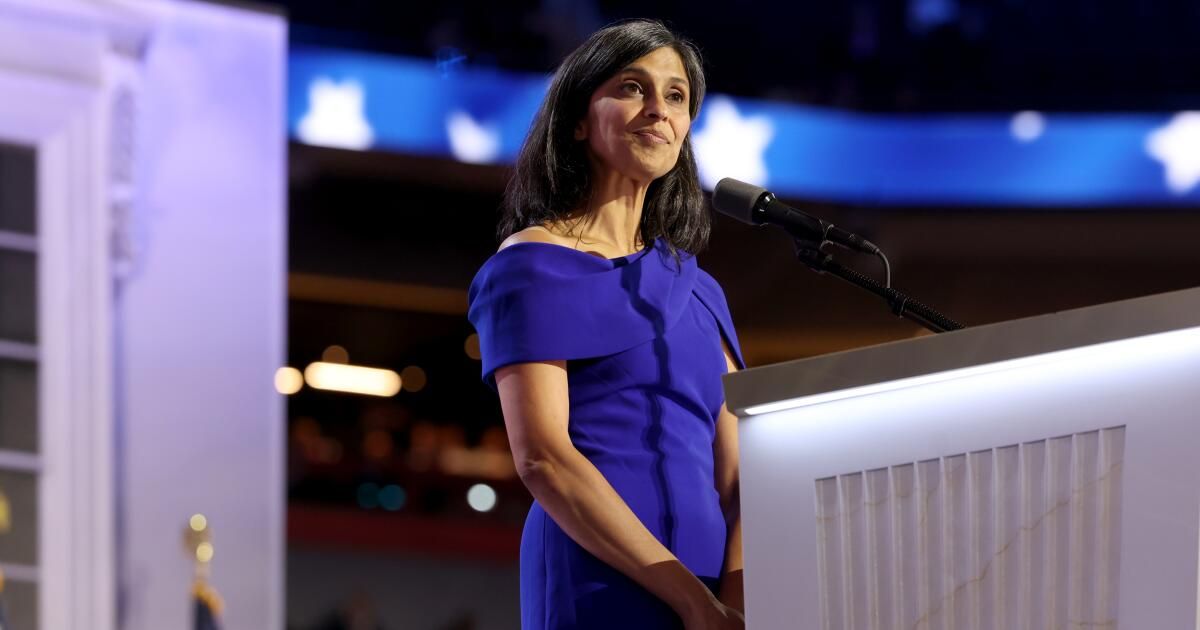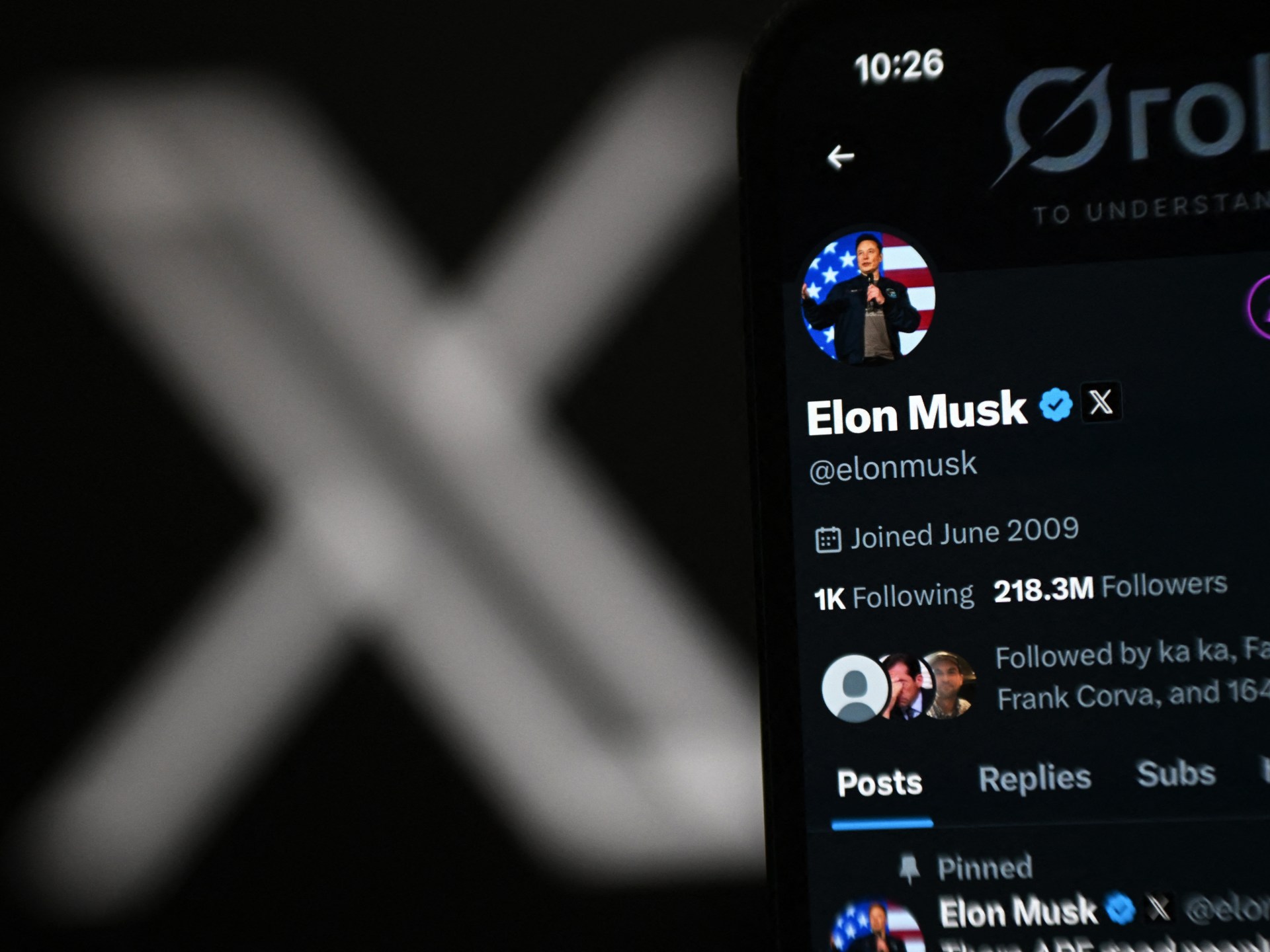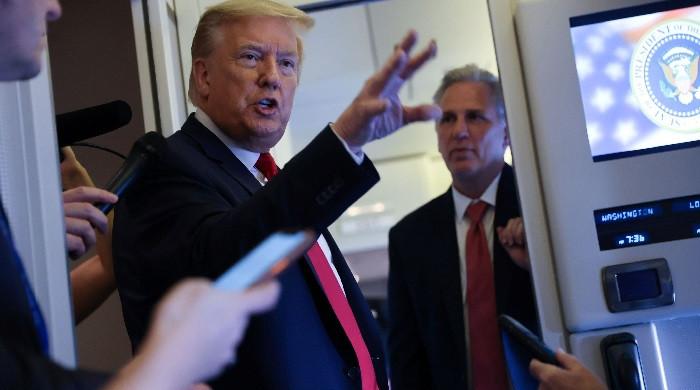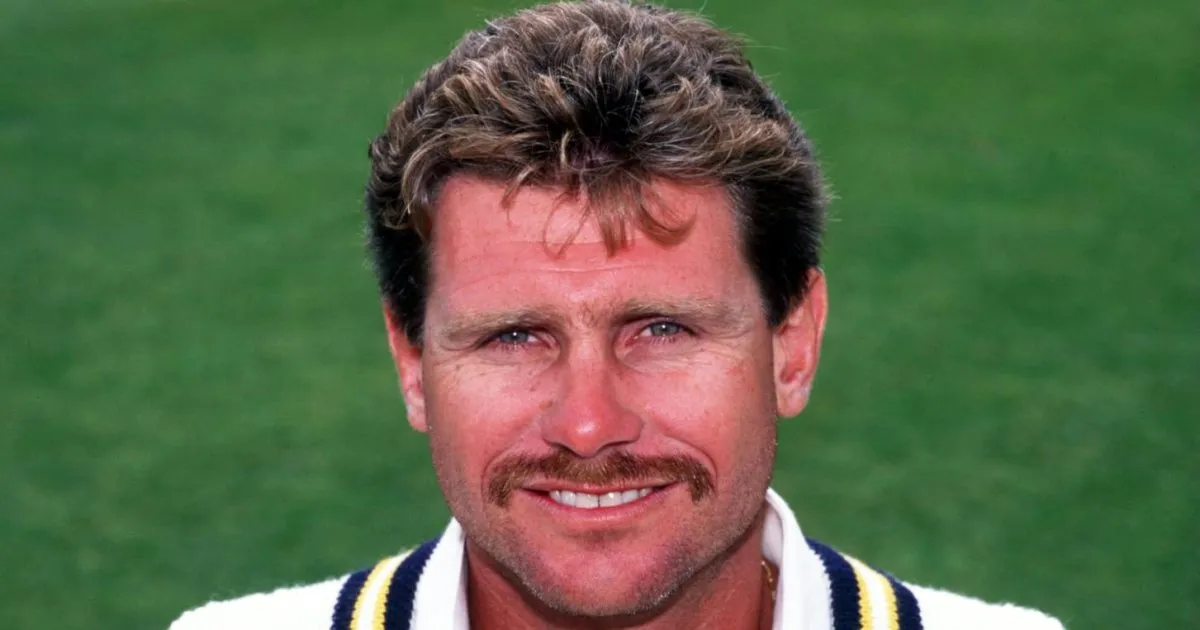As she stepped onto the podium, Usha Chilukuri Vance looked out at the raucous crowd dressed in red, white and blue, with bedazzled flags, wide-brimmed cowboy hats and sequined elephant earrings.
She smiled widely, though a little nervously.
It was her debut at the Republican National Convention. By her own admission, when she was asked to introduce her husband, Senator JD Vance of Ohio, she wasn't sure what to say.
“I thought there was only one thing to do: explain to him from the heart why I love and admire JD and why I am here by his side.”
Vice presidential candidate JD Vance stands onstage with his wife, Usha, at the 2024 Republican National Convention. The two met while studying at Yale Law School.
(Robert Gauthier/Los Angeles Times)
The 38-year-old California native and daughter of Indian immigrants is probably not the most important cheerleader for Donald Trump's MAGA movement, at least not at first glance.
She is a former Democrat who registered as a Republican only a few years ago. Politically reticent, she has spent years avoiding the brunt of the culture wars.
She is a corporate lawyer who has hard-won many of the elite academic and corporate credentials that tend to draw scorn from a new generation of Republican populists. Until this week, when her husband became Trump’s running mate, she was working as a litigator at a prominent San Francisco law firm.
But Vance has clerked for notoriously conservative jurists: Chief Justice John G. Roberts Jr. and Judge Brett M. Kavanaugh when he served on the U.S. Court of Appeals for the District of Columbia Circuit.
In her new role as a loyal MAGA spouse and potential second lady of the United States, she stayed away from politics as she addressed the convention.
She launched into a sweet story of her courtship with the Republican firebrand who has attacked colleges and Wall Street as the enemy, backed Trump's baseless claims of voter fraud and said deporting 20 million immigrants will lower home prices for Americans.
When she met her future husband at Yale, she said, “Then, as now, he was the most interesting person I knew.”
“A working-class guy who had overcome a childhood trauma that I could barely understand,” he added. “A tough Marine who had served in Iraq, but whose idea of a good time was playing with puppies and watching the movie ‘Babe.’”
Her husband, she said, was a “meat and potatoes” man who adapted to her vegetarian diet and learned to cook Indian food for his mother.
It wasn’t exactly a mouthful for the base, but Republicans had plenty. Just before she spoke, Donald Trump Jr. had railed against “incompetent, bankrupt Biden” and led the crowd in chants of “Fight! Fight! Fight!”
That was not her style. If Usha Vance has a role in today’s Republican Party, it is to present a softer version of Republicanism to Americans in the battleground states who may be turned off by Trump’s divisiveness, authoritarianism and felony convictions.
He presented his love story as a modern, quintessentially American one between a working-class boy from a Rust Belt town in Ohio and an Indian-American girl from a San Diego suburb. “The fact that JD and I were able to meet, let alone fall in love and marry, is a testament to this great country,” he said.
The crowd cheered and applauded, but the applause was more muted than that for Donald Trump Jr.
Still, Republican Party strategists said she had done her job.
“She did exactly what we knew she was capable of doing: She introduced her husband and it was a resounding success,” said Jai Chabria, a friend, adviser and former strategist for JD Vance’s Senate campaign.
He praised her authenticity and noted that she wrote her speech herself.
“She’s the secret weapon,” Chabria said. “Look, this is not the life she craves, the political spotlight. But she’s an incredible storyteller of her life.”
Usha Chilukuri, a second-generation Indian, grew up in the northeast San Diego suburb of Rancho Peñasquitos, a once solidly Republican area that has become more liberal and diverse after waves of immigrants moved in and the biotech industry boomed.
She is the daughter of academics: her mother is a marine molecular biologist and chancellor of UC San Diego, her father is an aerospace engineer and professor at San Diego State University.
She excelled at Mt. Carmel High School and developed a reputation among her peers as a fierce competitor.
“It's not enough to know the answers, you have to do it quickly,” Usha, 17, told the San Diego Union-Tribune while practicing for her high school trivia championship.
He studied history at Yale and then traveled to England to pursue a graduate fellowship at Cambridge University. His curriculum of early modern history was esoteric: it focused on John Field, a printer who worked between 1642 and 1668 in London and Cambridge, and investigated the development of copyright in 17th-century England.
By the time she returned to Yale to study law and met James Hamel (the name JD Vance was known by in college), she was already an expert at navigating an institution he barely understood.
“Usha was like my spiritual guide at Yale,” he wrote in his memoir, “Hillbilly Elegy.” “She instinctively understood the questions I didn’t even know I should ask and always encouraged me to seek opportunities I didn’t know existed.”
He fell in love.
“She seemed like some kind of genetic anomaly, a combination of all the positive qualities a human being should have: intelligent, hard-working, tall and beautiful,” he wrote.
Usha Vance gave him advice on how to perfect his writing. She urged him to attend office hours and cultivate relationships with his professors, and even advised him on how to use silverware at fancy corporate dinners.
Voter registration records document that Usha Vance was registered as a Democrat in 2014, the year after she graduated. But in college, she was not openly political.
“I don’t recall a single political conversation with Usha,” said Elliot Forhan, a Democratic state representative in Ohio who attended Yale Law School with the couple and took an antitrust class with her. “I remember her being very fashionable, but she didn’t show her cards when it came to her political views.”
That was not unusual. Many Yale law students were wary of making political comments, Forhan said, for fear of losing favor and a coveted law clerkship. But J.D. Vance was different. He openly espoused conservative beliefs and organized a reading group around the writings of Edmund Burke, the Anglo-Irish statesman and philosopher considered the founder of modern conservatism.
They graduated in 2013. They got married in 2014 and now have three children: Ewan, Vivek and Mirabel.
The Vances moved to the San Francisco Bay Area. JD worked in biotech while Usha became an associate at Munger, Tolles & Olson, one of the nation’s top corporate law firms representing companies such as Airbnb, Meta, Google, and Disney. The firm has been described by American Lawyer as “radically progressive” and “a top contender in the cool, progressive people category” due to its diversity initiatives, generous maternity leave, and openness to remote work.
The Vances immersed themselves in San Francisco’s social life, volunteering at the local community garden and networking with lawyers and tech leaders. But they kept moving to advance their careers. In 2017, the year she gave birth to her first son, Ewan, they moved to Washington so she could work as a secretary for Roberts.
A year earlier, her husband had burst onto the national stage with “Hillbilly Elegy,” his groundbreaking memoir that addressed generational unemployment, opioid addiction and poverty in white rural America.
During that time, JD Vance declared himself a “never Trump supporter.” In an article published in The Atlantic, he claimed that Trump offered overly simple solutions to complex problems. “He never offers details about how those plans will work, because he can’t,” he wrote. “Trump’s promises are the needle in America’s collective vein.”
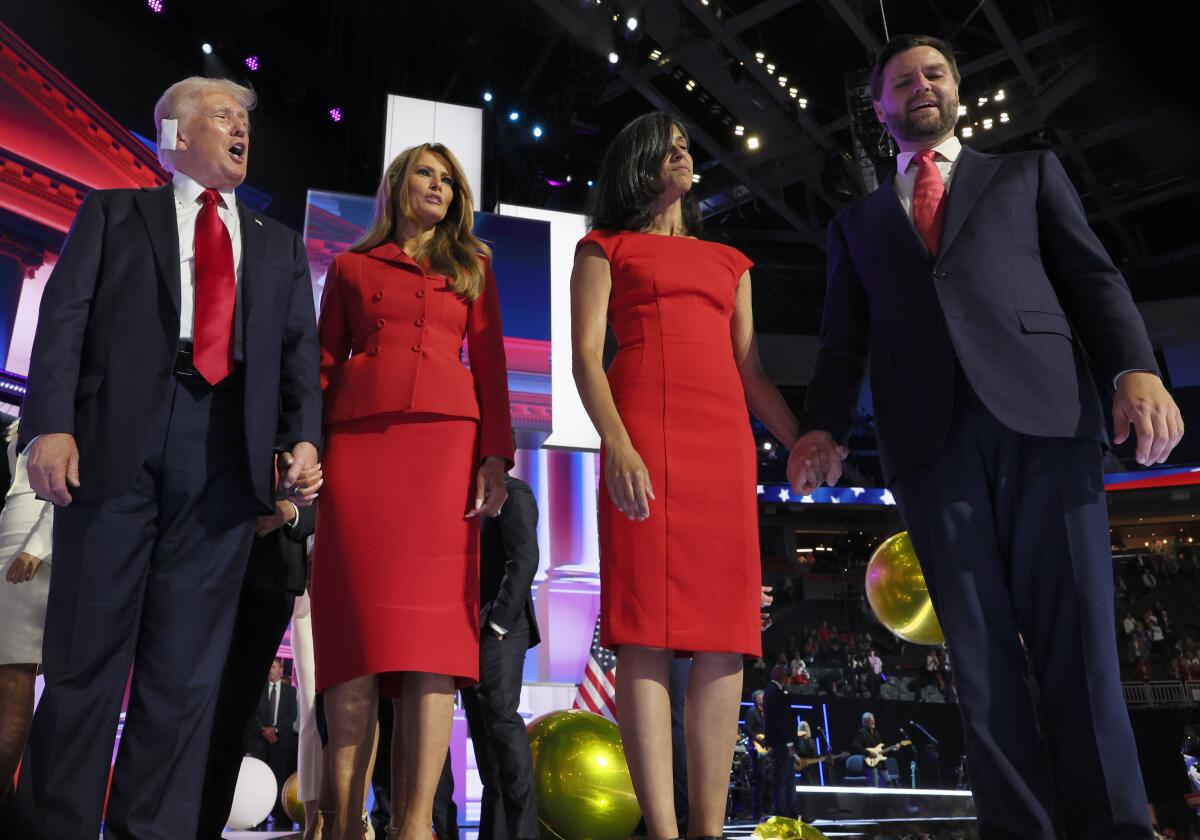
Donald and Melania Trump join Usha and JD Vance at the Republican National Convention on Thursday night.
(Robert Gauthier/Los Angeles Times)
But JD Vance apologized to Trump when he ran for Senate in 2022.
He endorsed Trump after the attack on the U.S. Capitol on January 6, 2021, which called into question the results of the 2020 election and suggested that Vice President Mike Pence was wrong to refuse to certify Joe Biden's victory, and convinced Trump to endorse him. He won and took office in January 2023.
Usha Vance rejects the idea that her husband betrayed his values or, as some critics allege, sold out to Trump. On stage in Milwaukee, she said: “The JD I knew then is the same JD we see today, except for the beard.”
But if the Ivy League lawyer, renowned for her analytical skills, understood the thread that ran through JD Vance's political career, she did not attempt to explain it to the American people.
J.D. Vance’s goal as a vice presidential candidate, he said, was the same as his goal as a husband and father: “to keep people safe, create opportunities, build better lives and solve problems with an open mind.”
When her husband joined her on stage, she kissed him.
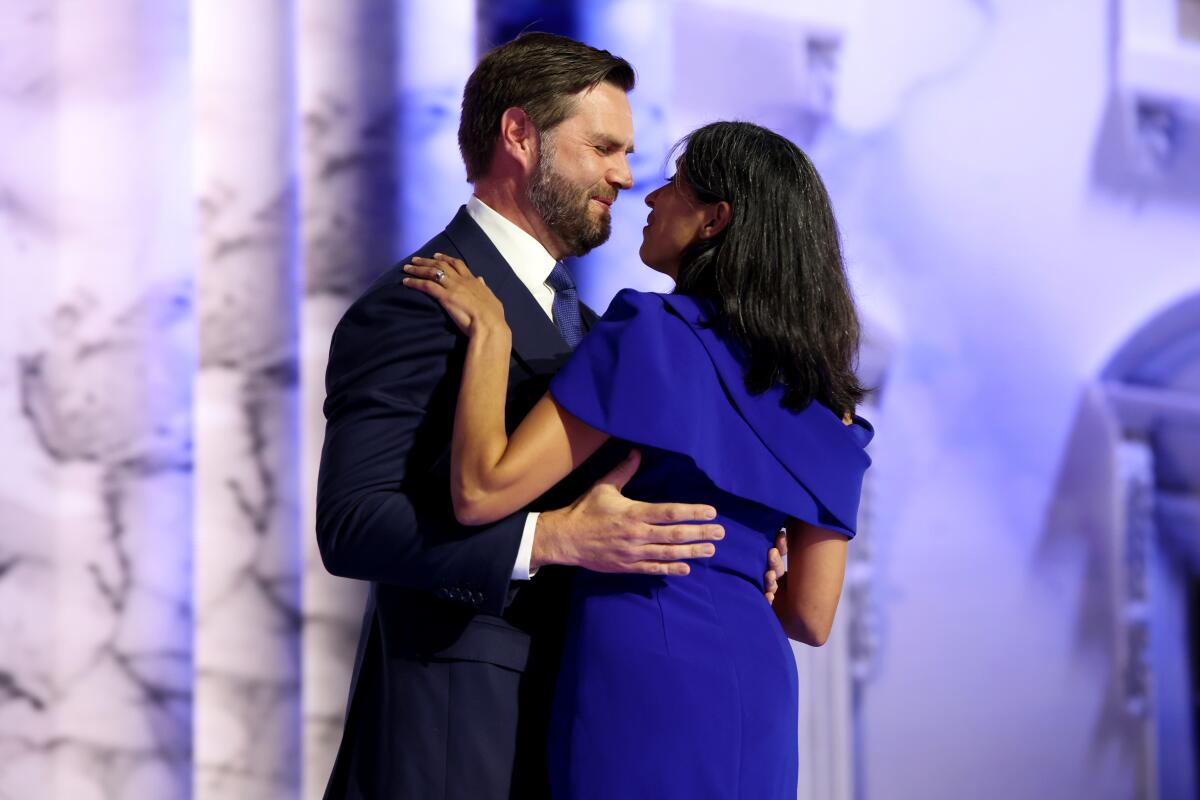
Sen. JD Vance (R-Ohio) hugs his wife, Usha, as he arrives to speak during the Republican National Convention on Wednesday.
(Jason Armond / Los Angeles Times)
They exchanged a long hug before the room filled with the country tones of Merle Haggard’s “America First.”
She had done her job. She had humanized her husband. Then she came back into the spotlight.

